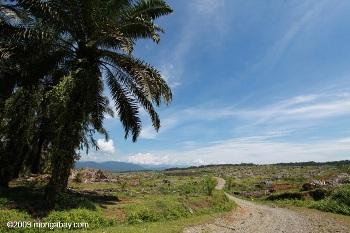A new study in Ecological Management & Restoration has found that reforesting rainforest captures more carbon than monoculture plantation and even mixed species plantations. The research tested three projects in north-eastern Australia: a rainforest reforesting project using a variety of native trees, a mixed species plantation, and a monoculture plantation of conifers.
“Compared to the monoculture plantations reforestation projects were more densely stocked, there were more large trees and the trees which were used had a higher wood density then the conifers at the plantation, explained co-author Dr John Kanowski an ecologist with the Australian Wildlife Conservancy in a press release.
 Oil palm trees cut in order to establish a new plantation for palm oil production on the Indonesian island of Sumatra. Photo by: Rhett A. Butler. |
The study found that on average a hectare of restored rainforest stored 106 tons of carbon: over 40 tons of carbon more than a hectare of monoculture conifer plantation and 20 tons more than a hectare of mixed species plantation.
Environmentalists have long argued against turning to vast monoculture plantations as a way to mitigate climate change, since such plantations erode biodiversity, putting many species in danger. In addition, plantations have sparked conflict with indigenous tribes and polluted water supplies.
According to Kanowski this new study puts to rest the idea that monoculture plantations store more carbon than rainforest projects.
“Carbon markets have become a potential source of funding for restoration projects as countries and corporations seek the cheapest way to reduce carbon emission. However, there is a concern that this funding will encourage single species monoculture plantations instead of diverse reforestation projects, due to the widely held belief that monocultures capture more carbon.”
Still Kanowski admits that there are economic difficulties in choosing forest restoration over plantations, since restoration projects cost more than implementing a plantation.
Related articles
Scientists sound warning on forest carbon payment scheme

(07/22/2010) Scientists convening in Bali expressed a range of concerns over a proposed mechanism for mitigating climate change through forest conservation, but some remained hopeful the idea could deliver long-term protection to forests, ease the transition to a low-carbon economy, and generate benefits to forest-dependent people.
Scientists warn that Malaysia is converting tropical forests to rubberwood plantations
(06/24/2010) The Association for Tropical Biology and Conservation (ATBC) has condemned Malaysia’s booming practice of converting tropical forests into rubberwood plantations, arguing that the conversion threatens Malaysia’s biodiversity, endangered species, and releases significant greenhouse gas emissions.
Rainforest scientists urge UN to correct “serious loophole” by changing its definition of ‘forest’
(06/24/2010) The Association for Tropical Biology and Conservation (ATBC) has released a resolution urging the UN to change its definition for ‘forest’, before the controversial definition undermines conservation efforts, biodiversity preservation, carbon sequestration, and the nascent REDD (Reducing Emissions through Deforestation and forest Degradation).